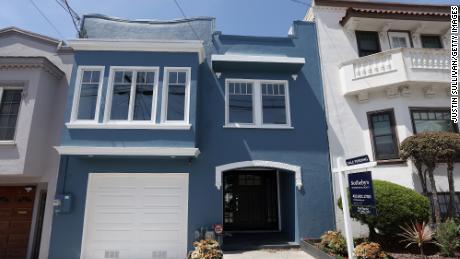[ad_1]
Jones, 48, planned to build equity by buying a home in the South Phoenix neighborhood where she grew up. Instead, she’s on the sidelines, facing skyrocketing rent and struggling to restart the process of looking for a place of her own.
“It was very defeating, very discouraging,” Jones said. “That’s the American Dream. Once you buy a home, you feel that you’re accomplished.”
The market is pricing out first-time homebuyers of all backgrounds, but Black buyers face even bigger barriers.
Black applicants were denied home loans at a much higher rate than other groups, according to a Zillow analysis of data from the Home Mortgage Disclosure Act. Nearly 20% of Black applicants were denied a mortgage in 2020 compared to 10% of White applicants. Credit history was the most common reason given to Black applicants for being denied.
But few programs are currently in place to help Jones and other prospective buyers struggling to afford a home.
That creates a huge hurdle in the current hot housing market, where investors with cash offers are buying up more property than ever to rent or flip. Investors bought a record 18.4% of the US homes purchased in the last quarter of 2021, up from 12.6% one year earlier, according to a Redfin analysis of county records.
In Phoenix, investors are particularly active, purchasing 28.4% of properties in the same timeframe.
Jones spent nearly a year trying to buy her first home there. She had started saving money and had been approved for an FHA loan that would require just 3.5% down. But with less than $6,000 set aside for a down payment, Jones couldn’t compete and eventually quit searching.
“Every time I put in an offer, every time I went to look at something, I was outbid, or somebody had already grabbed it,” Jones said. “I just put it on the back burner, because I can’t afford what’s out there right now.”
Maisha Fair, Jones’ realtor, says many of her Phoenix clients are facing the same predicament.
“They no longer can purchase. They’re stuck in the rental market,” Fair said. “And it’s hurting those who live here.”
Some experts expect these market conditions to widen the racial homeownership gap.
Census data show nearly 45% of Black families own their home, compared to 74% of White families. The gap has barely changed since the 1960s, when the Fair Housing Act outlawed housing discrimination.
“Unfortunately, the homeownership gap has actually widened,” Jessica Lautz, vice president of demographics and behavioral insights at the National Association of Realtors, said. “The pandemic has exacerbated everything. When we look at the inequity in homeownership, we do see that Black homebuyers are having a harder time entering into the home buying market, because they have been harder hit through the pandemic.”
“The homeownership gap will exacerbate the wealth gap,” Andre Perry, senior fellow at the Brookings Institution, said. “When people aren’t buying homes, it just makes it harder for future generations to buy homes… When we ignore wealth, we essentially bury our head in the sand to the discrimination and the barriers that preclude many people, even with high incomes, from buying a home.”
Skyrocketing rent costs may widen the racial wealth gap even further and displace more people.
Rent in the US hit a new record high in April, and is expected to keep rising. The national median rent was $1,827 per month, up 16.7% from a year ago, according to a report from Realtor.com.
“The market is definitely speeding up gentrification,” Perry said. “What that really means is that people are going to be pushed out to low-wealth, low-resource suburbs. That people are going to be farther away from their jobs, and families will struggle.
In Phoenix, realtor Maisha Fair says investors aren’t just purchasing properties — they’re driving rent prices so high that families are forced to move.
“They no longer can live in a neighborhood where they know their neighbors,” Fair said. “The same investors that are coming in and purchasing these homes cash are now renting to those same people that wanted to buy the home,” Fair said.
Jones’ rent in Phoenix rose by $400 per month. She burned through the $6,000 she had set aside for a down payment after losing her job for a few months. Now she’s far more focused on making ends meet than making her dream of homeownership a reality.
“It’s all money… I can’t afford to even live over there,” Jones said. “So yeah, it’s heartbreaking.”
[ad_2]
Source link





